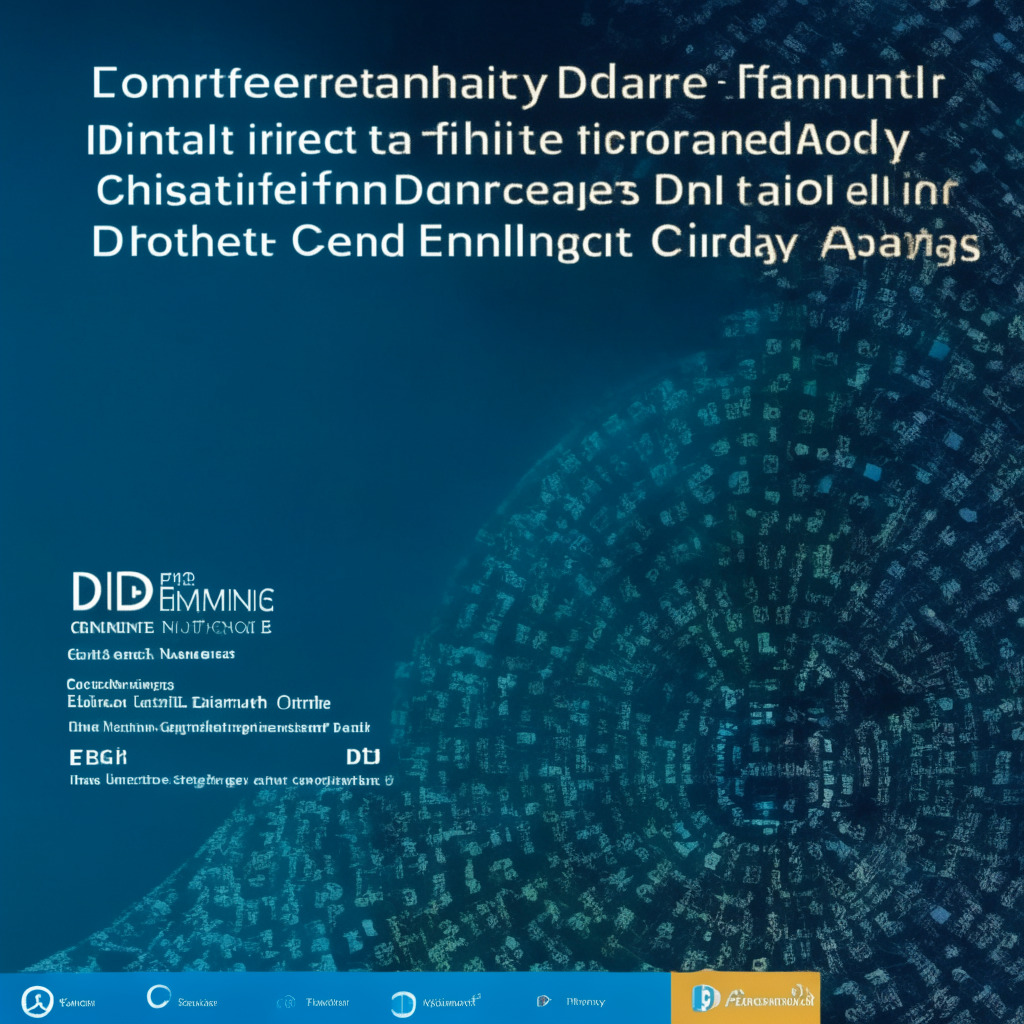U.K. lawmakers are divided on cryptocurrency regulations, with some suggesting treatment like gambling, while others support existing financial services regulations. The All Party Parliamentary Group (APPG) for crypto assets supports the government’s proposal, citing effective tax collection and robust consumer protections associated with financial services regulations. The debate continues as U.K. lawmakers seek a balanced approach for a safe and secure crypto market.
Search Results for: uk
UK FCA Cracks Down on Crypto Ads: New Regulations and Their Impact on the Market
The UK’s Financial Conduct Authority (FCA) plans to implement stringent regulations on crypto advertising, requiring “clear risk warnings” and prohibiting incentives. This comes as part of the country’s post-Brexit financial strategy, incorporating crypto into UK-regulated financial activities. Crypto companies must also ensure promotions are fair and non-misleading to follow these guidelines.
NFT Battle in UK Album Charts: Gallagher vs. Foo Fighters & The Future of Music Industry
In a race to top the Official UK Album Charts, Noel Gallagher collaborates with Web3 startup Serenade to create a limited-edition NFT pressing of his album “Council Skies.” The NFT offers high-quality WAV files, a documentary on the album’s making, and signed artwork, reflecting the growing value and versatility of NFTs in the music industry.
UK Considers Appointing a Crypto Tsar: Will It Strengthen Regulation and Innovation?
The Crypto and Digital Assets All Parliamentary Group (APPG) has published 53 recommendations for the UK government, including the appointment of a ‘Crypto Tsar’ to ensure a coordinated regulatory approach for the crypto and digital assets space. The report emphasizes the need for protecting consumers, promoting economic growth, and fostering innovation as the sector continues to grow rapidly.
UK Lawmakers Push for Speedy Crypto Regulations: Potential Impact on Innovation and Leadership
U.K. lawmakers from the Crypto and Digital Assets All Parliamentary Group are urging the government to implement timely cryptocurrency financial services regulations and appoint a dedicated official to oversee the process. They emphasize the immediate need for regulation to protect consumers and ensure the U.K.’s leadership in the sector.
Regulating DeFi Applications: ConsenSys Proposal for UK Authorities and Its Challenges
ConsenSys, an Ethereum development studio, suggests that the UK government should focus on regulating crypto applications rather than blockchain protocols. This targeted approach aligns with Web2 internet regulation, addressing potential risks and specific activities without imposing limitations on blockchain infrastructure. The UK Treasury will review received feedback to shape its regulatory response, balancing safety and innovation in the DeFi and cryptocurrency industry.
Crypto Markets Tumble Amid US Debt Ceiling Fears and UK Inflation: Analyzing the Impact
Crypto markets faced a shake-up as concerns over UK inflation and Janet Yellen’s U.S. debt ceiling warning sent prices spiraling. The Federal Open Market Committee minutes revealed divided opinions on rate hikes, affecting investor confidence. Major cryptocurrencies, including Bitcoin and Ether, experienced significant declines, reflecting reduced investor optimism.
Crypto Market Decline Amid UK Inflation Surge and Binance Allegations: Navigating Complexities
UK inflation hit 6.8%, Bitcoin fell under $27,000, and Binance faced allegations of commingling customer funds with company revenue. Japan prepares stricter anti-money laundering measures, while Cardano’s ADA sees whale accumulation. These complexities impact the crypto market, highlighting a battle between transparency and skepticism.
Winklevoss Twins Eye UK Expansion: Boon or Bane for Crypto Landscape?
The Winklevoss twins, founders of the Gemini crypto exchange, are eyeing the UK for expansion amidst challenges in the US market. Despite concerns about Britain’s inconsistent attitude towards cryptocurrencies, the intended investment has potential to boost the local crypto industry, benefiting both Gemini and the UK economy. However, uncertainties in the regulatory environment may deter full commitment.
UK Crypto Regulation: Gambling Framework or Finance Model? Striking a Balance
The UK Parliament’s Treasury Committee report suggests regulating unbacked cryptocurrencies like gambling, opposing the government’s ambition to make the UK a global crypto hub. The move raises questions about the country’s ability to foster a thriving digital asset ecosystem amidst stringent regulations.
Unmasking Crypto Corruption: Ukraine’s Challenge to Maintain a Thriving Market
Ukraine’s National Anti-corruption Bureau (NABU) is probing the crypto sector to unmask money launderers in collaboration with the United States Embassy and the US State Department. Aiming to scrutinize cryptoassets, the largest training program in NABU’s history will educate participants on combating cryptocurrency-related crimes and ensure that crypto is no longer a means to hide corruption.
Sanctions Against Binance US Investigator: Impact on Crypto Amid Russia-Ukraine Crisis
Russia expands its sanction list, including Binance U.S. Head of Investigation, BJ Kang, among 500 entities facing travel and financial restrictions. Binance is under scrutiny for reportedly generating high traffic from Russia, raising concerns over compliance with U.S. sanctions amid the ongoing Russia-Ukraine crisis.
UK Treasury’s Gambling-Style Crypto Regulation Faces Backlash: Striking a Balance for Growth
The Treasury Committee’s proposal to regulate unbacked cryptocurrencies like gambling has faced backlash from CryptoUK and Kraken UK. Critics argue that this approach overlooks sector nuances and hinders growth, while urging for a bespoke regulatory model for the UK’s cryptocurrency framework.
UK’s Crypto Trading as Gambling: Potential Regulation Sparks Debate and Conflict
The UK Treasury Committee recommends regulating crypto trading as traditional gambling, with the Gambling Commission overseeing the industry. This proposal sparks conflict between the committee and the crypto industry, as the latter sees it as a step backward for the UK’s digital currency aspirations.
UK Treating Crypto as Gambling: The Impact on Retail Investing and Industry Growth
A UK regulatory panel suggests treating retail investing in unbacked cryptocurrencies like Bitcoin as gambling due to volatility and lack of intrinsic value. This approach could result in heavier taxes and compliance with gambling regulations, possibly hindering innovation and industry growth.
UK Lawmakers Push for Crypto Trading as Gambling: Regulations and Implications Explored
The UK Treasury Committee recommends regulating retail trading of unbacked crypto assets like Bitcoin and Ether as gambling due to their price volatility and lack of intrinsic value, potentially posing significant risks to consumers. The committee acknowledges potential benefits of cryptocurrencies in financial services and markets and supports developing a regulatory framework to mitigate risks.
IRS and Ukraine Tackle Crypto Fraud: Balancing Innovation and Market Integrity
The IRS partners with the Ukrainian government to tackle cryptocurrency fraud globally, focusing on Russian individuals suspected of evading sanctions. They will provide training on tracing blockchain transactions for Ukrainian officials using a tool developed by Chainalysis. This increased scrutiny raises concerns for the crypto industry, but Brian Armstrong, Coinbase CEO, argues that blockchain’s transparency deters illicit activities.
Bitcoin’s Struggle at $25K: Bulls vs Bears, UK Seizing Crypto & the Market’s Future Direction
Bitcoin recently experienced a 10% price decline, raising questions about its key $25,000 support level. As market sentiment and price action influence Bitcoin’s future direction, long-term holders continue accumulating tokens despite the cryptocurrency’s decline. Monitoring the price will help determine the market’s direction in the coming days.
UK FCA’s New Crypto Regulations: Balancing Investment Opportunities and Consumer Risk
The UK’s financial regulator, FCA, introduces new crypto regulations requiring firms to tighten their marketing practices, ensuring consumers invest with the awareness of high risks associated with crypto assets. These rules emphasize clear risk communication and will apply to both UK-based and non-UK firms, promoting consumer protection and market integrity.
US Lags Behind EU and UK in Crypto Regulation: Analyzing the Gap and Implications for Innovation
US House Representatives highlight regulatory gaps in the country’s crypto framework compared to advanced systems like the EU’s MiCA and UK’s digital asset regulation. Upcoming Congress hearings could shape the future of US digital asset regulation, fostering a clearer, comprehensive regulatory landscape.
UK’s Crypto Regulation Approach: Collaboration or Post-Brexit Isolation?
The UK’s proposed cryptocurrency legislation receives positive feedback, emphasizing collaboration with global regulators to avoid post-Brexit isolation. Regulatory clarity in the UK aims to accelerate innovation adoption while reducing risks, with a different approach from the EU’s MiCA regulation. The government plans to publish crypto-specific rules within a year.
Debating Anonymity in Digital Pounds: CBDCs vs Cryptocurrencies in the UK
At a recent Financial Times Cryptocurrency and Digital Assets Summit, Tom Mutton, the Bank of England’s head of fintech, discussed the UK’s plans for a central bank digital currency (CBDC) focusing on privacy and anonymity. While emphasizing privacy, Mutton stated that anonymity would not be intended for the digital pound and it would not be interoperable with cryptocurrencies. The Bank of England’s approach raises questions on the role of anonymity, privacy, and interoperability in the financial ecosystem.
UK’s FCA Crypto ATM Crackdown: Balancing Innovation and Consumer Protection
The UK’s Financial Conduct Authority (FCA) is cracking down on illegal cryptocurrency ATMs, raising concerns about regulatory oversight in the crypto space. These efforts reflect the growing global push for crypto regulation to protect users from scams and money laundering, while balancing the need for innovation and mainstream adoption of cryptocurrencies.
UK CMA Dives into AI Impact: Balancing Growth, Consumer Protection, and Competitive Markets
The UK’s Competition and Markets Authority (CMA) will examine AI technology’s impact on consumers and the economy, focusing on foundation models like OpenAI’s ChatGPT to ensure safety, transparency, fairness, and accountability. The CMA’s review aims to promote open, competitive markets and effective consumer protection, concurrently fostering AI growth and user protection from misinformation.
UK’s War on Crypto Fraud: Balancing Innovation and Investor Protection
The UK government plans to ban cold calls related to insurance and cryptocurrencies, employing 400 new staff and new anti-spoofing equipment to tackle £7 billion annual fraud costs. The Financial Conduct Authority faces challenges balancing investor protection and nurturing innovation in the crypto industry.
UK Crypto Ad Regulations: Balancing Innovation and Consumer Protection
UK lawmakers have approved an amendment permitting registered crypto firms to greenlight their advertisements under anti-money laundering guidelines. This aims to protect consumers from deceptive crypto ads, while potentially increasing transparency and consumer protection in the crypto sector. However, the amendment’s effects on growth and innovation remain uncertain.
UK’s Rise as a Crypto Powerhouse: Pros, Cons, and the Future of Blockchain Technologies
The UK is emerging as a leading crypto hub with its robust financial infrastructure and supportive policymakers. London has been recognized as one of the best cities for crypto businesses, and the country’s government emphasizes the importance of a central bank digital currency and aims to lead in Web3 and metaverse advancements.
UK’s Battle Against Crypto Fraud: Striking the Balance Between Regulation and Innovation
The UK government is cracking down on financial fraud, including cryptocurrency schemes, amidst a surge in crime costing £7 billion annually. Proposed measures include the Economic Crime and Corporate Transparency Bill, empowering law enforcement to seize illicitly-used crypto assets, and potentially banning cold calls marketing financial products. Policymaker’s challenge lies in protecting investors while nurturing a compliant, innovative digital asset market.
UK’s Battle Against Fraud: Impact on Crypto Market and Striking the Innovation-Security Balance
The UK government plans to stop cold calls selling financial products, including insurance and cryptocurrencies, to tackle £7 billion in annual fraud costs. By collaborating with The Office of Communications (Ofcom), the focus is on countering phone number “spoofing,” while balancing security and fostering innovation within the crypto industry.
Navigating Crypto Regulation: UK’s Balancing Act for Consumer Protection and Growth
British MP Lisa Cameron, chair of the Crypto and Digital Assets APPG, emphasizes consumer protection in cryptocurrency policies, seeing economic benefits and job opportunities in the sector. The U.K. aims to create policies balancing digital asset opportunities with transparency and consumer protection while addressing regulatory concerns.
UK’s Proposed Crypto Regulatory Framework: Key Debates and Industry Insights
The UK’s HM Treasury recently closed its consultation period on the proposed crypto asset regulatory […]
Hacker Heist: Stealing Russian Crypto for Ukraine’s Cause or An Inside Job? Pros and Cons Revealed
An unnamed Bitcoin user reportedly hacked hundreds of wallets purportedly controlled by Russian security services, […]































